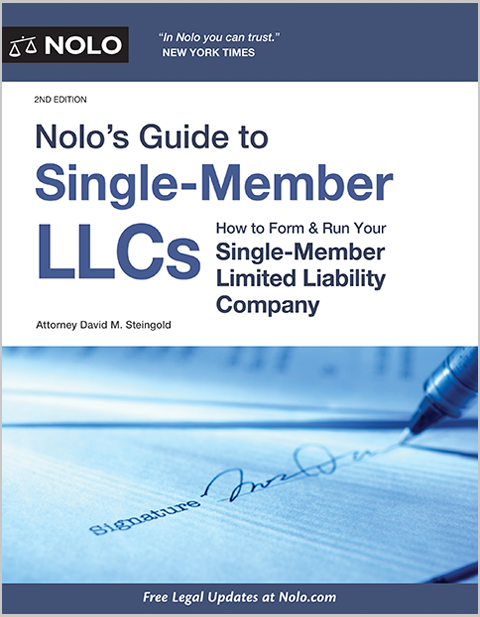Learn the rules in your state about SMLLCs, charging orders, and personal liability protection.
Whether you're considering forming a single-member LLC or have already made one, this book is your easy guide to success
A single-member limited liability company ("SMLLC") is a business entity similar to a limited liability company ("LLC"), except that a SMLLC only has one member. SMLLC'S are popular because they allow a single owner business to be treated like an LLC. Up until fairly recently, there were some states that did not allow LLCs to have only one member. Now, all states and the District of Columbia either allow LLC'S to have one member or permit the formation of a SMLLC.
Formation
To form a SMLLC, you submit your articles of incorporation and the required fees to your secretary of state's office. The process is similar to what's required for LLCs. Check your secretary of state's office to see if there are any additional requirements.
Asset Protection
An LLC provides the same protection as a corporation against creditors of the business. However, there is some uncertainty as to whether a SMLLC member will receive the same protection from liability that members of an LLC with multiple members receive. While the law is clear in most states, this is still an evolving issue.
There is one circumstance where a multiple member LLC holds a distinct advantage over a SMLLC. Generally, a creditor of an LLC member can only seek what is known as a "charging order" against the member's interest in the LLC. With a charging order, the creditor cannot directly attach the assets of the LLC but instead receives any payments made from that member's distributional interest.
With single member LLCs, there is some uncertainty as to whether creditors would be limited to a charging order since the rationale for protecting members from other members' personal debts does not apply if there is only one member. Courts in some states have found that the charging order protection doesn't apply with single member LLCs and have allowed creditors to pursue other remedies, including foreclosing on the member's interest or ordering the LLC dissolved. Other states, like Nevada and Wyoming, have recently changed their laws to make clear that the charging order protection for debtors applies with all LLCs, regardless of whether they are single or multi-member entities. See LLC Assset Protection and Charging Orders: A 50-State Guide for more information on creditors' rights and liability protection with single and multi-member LLCs, including the state law variations.
State Laws on SMLLC and Personal Liability Protection
To see how your state deals with the issue of creditors' rights and SMLLCs, follow the link below:
SMLLCs are also susceptible to "piercing the corporate veil," which occurs when the courts find that the entity and the owner are not really separate and thus the owner is personally responsible for the business's debts. The easiest way an opposing party can prove this is by demonstrating a lack of adherence to the LLC operating agreement or that the operating agreement is riddled with errors.
When drafting your operating agreement, make sure the terms specifically apply to a single-member entity and not a multiple member entity. Many templates are designed for multi-member LLC's. Such an oversight may allow an opposing party to successfully pierce the corporate veil in litigation. Moreover, many operating agreement templates are full of boilerplate language. With all the legalese, it's easy to overlook what's being said. Make sure you know what is required before you file the operating agreement with your secretary of state. Otherwise, an opposing party may be able to use this against you in an attempt to pierce the corporate veil.
Tax Treatment
For tax purposes, if the SMLLC does not opt to be treated like a corporation, it will be taxed like a sole proprietorship. The Internal Revenue Code states that the SMLLC will be treated as a disregarded entity if it is taxed like a sole proprietorship. This means that a SMLLC will be considered a sole proprietorship for tax purposes, but will not lose other benefits associated with being a corporate entity.
If you want your SMLLC to be treated as a corporation for federal tax purposes, you must file IRS Form 8832 with the Internal Revenue Service.




